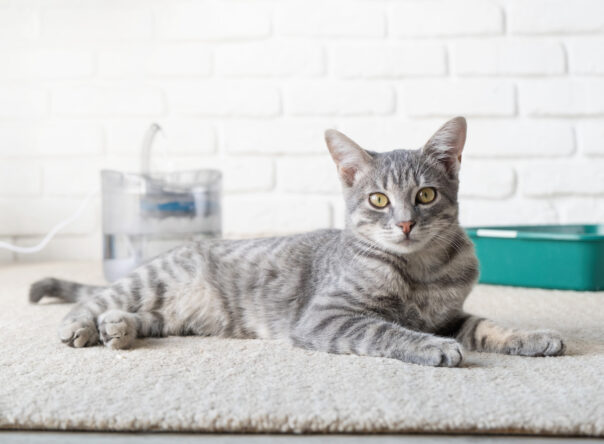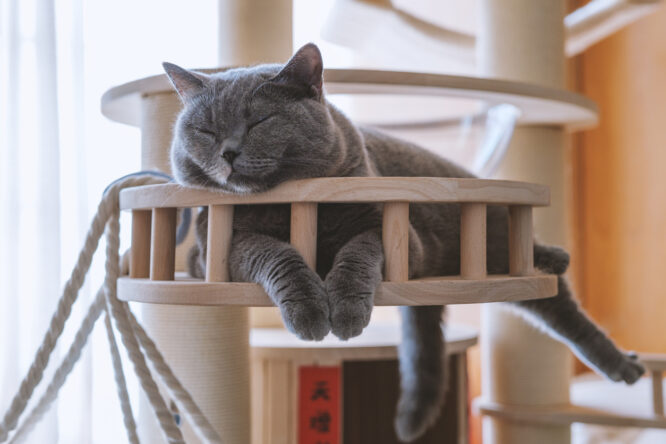If your cat seems extra clingy, vocal, or restless the moment the lights go out, you’re not alone.

Separation anxiety in cats is more common than people think, especially at night. They’re not just being dramatic or annoying; they’re stressed, and nighttime silence makes it worse. Whether it’s meowing from the hallway, scratching at the door, or pacing around like a tiny, furry insomniac, your cat is trying to say, “Hey, where are you going?” Here are some simple ways to help your cat feel safer, calmer, and less alone at night.
1. Give them a proper wind-down routine.

Just like us, cats benefit from a bit of structure before bed. Try giving them a predictable routine each evening—something that signals the day is ending and all is well. A little play session followed by a snack can help them burn energy and settle down.
If your cat knows what to expect, they’ll start to feel more in control of their environment. That alone can ease a lot of their anxiety. Yes, it might feel a little silly at first, but a five-minute wind-down is way better than being woken up by yowling at 2 a.m.
2. Leave behind your scent.

When you leave the room, your scent can be a massive source of comfort for your cat. Something as simple as a worn T-shirt or blanket that smells like you can go a long way in helping them feel connected even when you’re not there. Place it in their favourite sleeping spot or near their bed. It’s a little like leaving a voicemail that says, “I’ll be back soon,” in a language they understand. For anxious cats, that kind of reassurance is everything.
3. Don’t shut the door completely (if you don’t have to).

If possible, try leaving the door slightly ajar. Total separation can trigger more panic than necessary, especially in cats who like to check in on you during the night just to make sure you’re still breathing. Even if you don’t want them on your bed, just knowing they can reach you if they really need to might lower their stress enough that they don’t even bother. It’s the option that helps them relax, not necessarily the action.
4. Provide a warm, cosy sleeping area.

Comfort matters. A plush bed in a quiet, warm corner can do wonders for an anxious cat. They’re more likely to settle down if they have a space that feels safe, soft, and slightly enclosed, like a little cave just for them. You don’t need to spend a fortune. Even a box with a blanket will do the trick. Add a small heat pad or heated blanket (safe for pets) to mimic the warmth they’d usually get from you if they’re always snuggling in close.
5. Play with them before bedtime.

Anxious cats often have extra energy they don’t know what to do with. A solid play session before bed can help them release that nervous energy and change their focus to resting rather than worrying. Use a wand toy or a laser pointer for about 10 to 15 minutes. The goal is to get them tired and satisfied, not overstimulated. Follow it up with a few treats or a small meal so they go to sleep feeling calm and full.
6. Try a pheromone diffuser.

Feliway diffusers or sprays release synthetic pheromones that mimic the ones cats produce when they feel safe and content. For some cats, this can help soothe nighttime anxiety and make them feel more secure in your absence. It’s not magic, but it can take the edge off, especially in combination with other changes. Place the diffuser in the room where they sleep or the hallway outside your bedroom if that’s where they pace and cry the most.
7. Don’t reward the meowing—comfort before it starts.

It’s tempting to go soothe them every time they cry, but this can create a cycle where meowing equals attention. Instead, try to set them up for success before they start vocalising by making them feel safe and calm before bedtime. Consistency is key. If they know they get all their cuddles and contact in the hour before you go to bed, they won’t feel like they’re being abandoned once the lights go out. Reassurance works best as prevention, not reaction.
8. Offer background noise.

Nighttime silence can be unsettling for some cats. Leaving on a low hum—like white noise, soft music, or even a fan—can help create a more familiar environment that drowns out sudden noises and makes them feel less alone. There are even playlists designed specifically for calming cats. It might sound extra, but it can genuinely reduce stress levels in anxious pets. Think of it as the feline version of a sleep podcast.
9. Build up their confidence during the day.

Confident cats are less likely to get anxious at night. Spend time encouraging independent play and rewarding their curiosity. Let them explore different parts of the house, try puzzle feeders, or build little “cat zones” where they feel in charge. The more secure they feel in general, the less clingy they’ll become after dark. Nighttime anxiety is often just leftover daytime insecurity that hasn’t been dealt with yet.
10. Consider adopting a second cat (carefully).

For cats who seem especially lonely at night, a well-matched companion can help ease separation anxiety. But this is a big step—it only works if your current cat is likely to accept a new friend without added stress. If they’re social and playful with other cats, it might be a game changer. However, don’t rush it. Do your research, go slow, and be prepared for an adjustment period if you go down this path.
11. Talk to your vet.

If the anxiety is extreme—constant meowing, aggression, destructive behaviour—it’s worth checking in with your vet. There could be underlying health issues making things worse, or they might recommend anxiety treatments or behaviour support. It doesn’t mean your cat is “broken.” Some cats are just wired to be more sensitive, and getting professional advice can give you more tools to help them feel safe again.
12. Be patient—it takes time.

Helping a cat with separation anxiety isn’t about fixing it overnight. It’s about creating enough comfort, trust, and consistency that they stop feeling like every bedtime is a crisis. Some nights will still be tricky. However, with the right changes and a bit of patience, your cat will learn to relax again. And you’ll finally be able to sleep without a paw in your face at 3 a.m.




